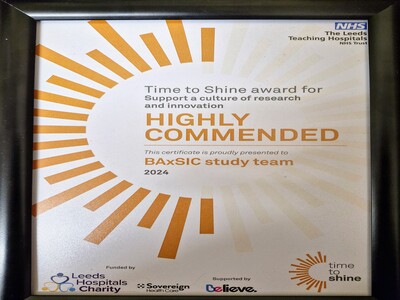The BAxSIC study provides a patient-centred platform to facilitate research and improve knowledge on
the impact of diagnostic delay in axial Spondyloarthritis in the UK
Participant Map
Updates & FAQs
BAxSIC Newsletter 5
BAxSIC Study - Newsletter # 5 Dear Investigators and Site Teams, [...]
Time to Shine Award 2024
We are thrilled to announce that the BaXSIC study team received [...]
BAxSIC Newsletter 4
BAxSIC Study - Newsletter #4 Dear Investigators and Site Teams, Go [...]
BAxSIC Study – Newsletter #3
BAxSIC Study - Newsletter #3 Dear Investigators and Site Teams, Go [...]
No, BAxSIC solely gathers existing data that is within the scope of standard NHS care. It is conceivable that patients may receive an MRI scan as part of the diagnostic process while not having X-ray images, or vice versa. In such instances, please include a comment in the BAxSIC electronic case report form (eCRF).
Yes, since BAxSIC is an observational study, participants are permitted to take part in additional studies, particularly other observational trials taking into account that these do not cause excess distress to the patient, for example through extra visits.
Importantly, caution is needed when considering participation in randomized double-blinded studies, as patients or their rheumatologists will not be aware of the treatment they receive. This information should be documented in the BAxSIC electronic case report form (eCRF) with an accompanying comment.
Yes, same-day consenting is allowed provided that as all questions and queries from the participant are addressed by the local team.
Yes, patients with a diagnosis of axSpA made within the past 6 months from the baseline visit, can be recruited retrospectively. However, they must attend an appointment within 6 months of the diagnosis to sign the ICF and allow for the collection of clinical data close to the completion of PRO questionnaires.
Upon obtaining the patient’s consent both the mNYC and ASAS classification criteria will be applied. Patients do not necessarily need to fulfil both sets of criteria. It is possible to encounter a patient who fulfils the ASAS but not the mNYC criteria, for example.
Determining a patient’s eligibility for participation in the study relies on a clinical diagnosis of axSpA, which is established through a comprehensive evaluation conducted by a rheumatologist. It’s important to note that there are no specific diagnostic criteria in place for this condition.




